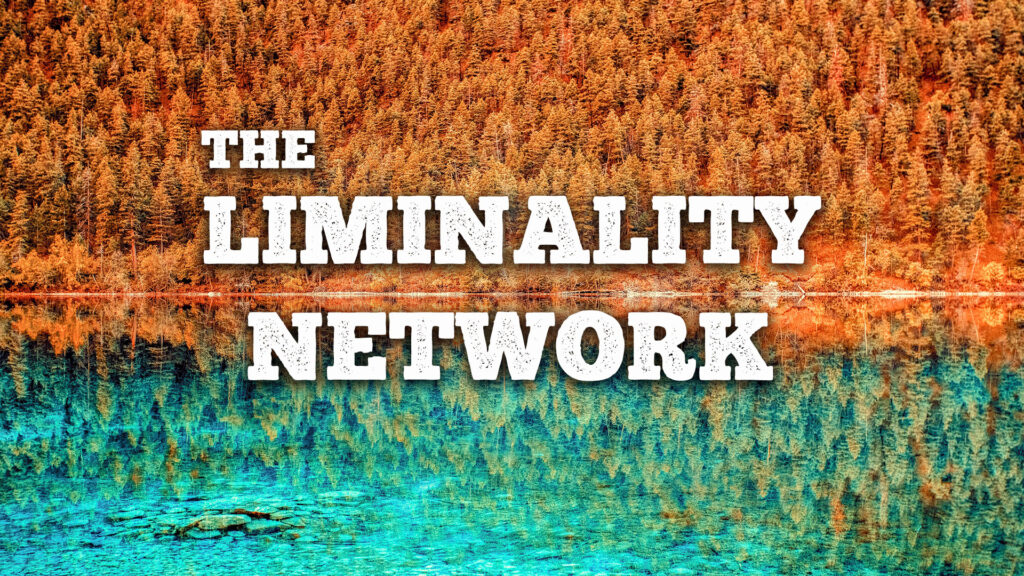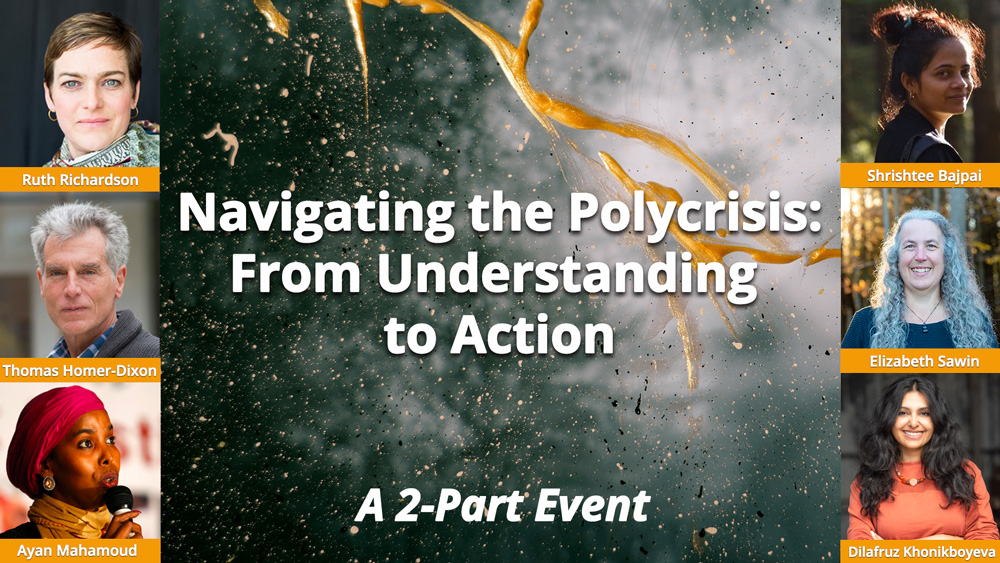
A quick scan of the news on any given day makes it clear why the term “polycrisis” has recently become so popular, as communities across the planet experience simultaneous environmental and social challenges. Sadly, with the further erosion of Earth’s life support systems and the destabilization of societies around the world, grappling with the polycrisis (multiple, interconnected, and compounding crises in global systems) will become a growing necessity for all of us, no matter where in the world or what role we play in our communities.
Please join us for a special, two-part online event series aimed at helping individuals from across the globe and a variety of sectors – civil society, governance, academia, grassroots movements, business, journalism, etc. – better understand and respond to the polycrisis, including drawing upon the lived experience of people on the frontline of the polycrisis. Registrants to this free event can participate in either or both sessions and will receive recordings of both.
The Sessions
Session 1: Understanding the Polycrisis
Date/Time: November 16, 2023 16:00-17:30 UTC

Ruth Richardson, Executive Director of the Accelerator for Systemic Risk Assessment (ASRA) at the United Nations Foundation, working to improve decision-making about current and future challenges.
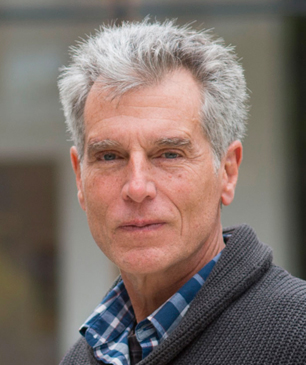
Thomas Homer-Dixon, Executive Director of the Cascade Institute, whose research focuses on threats to global security, including economic instability, climate change, energy scarcity, ideological polarization, and mass violence.
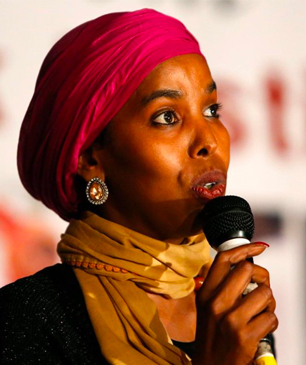
Ayan Mahamoud, head of the Socioeconomic, Policy, Research and Marketing Department for the Centre for Pastoral Areas and Livestock Development at the Intergovernmental Authority on Development (IGAD) in Eastern Africa.
Session 2: Responding to the Polycrisis
Date/Time: November 30, 2023 16:00-17:30 UTC
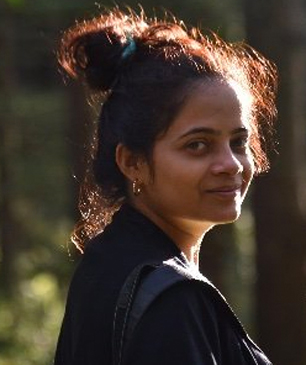
Shrishtee Bajpai, an activist-researcher from India working with the environment action group Kalpavriksh, whose work focuses on documenting, researching, and networking on radical alternatives to dominant systems.
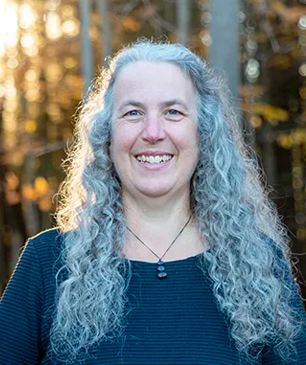
Elizabeth Sawin is Founder and Director of the Multisolving Institute and an expert on solutions that address climate change while also improving health, well-being, equity, and economic vitality.
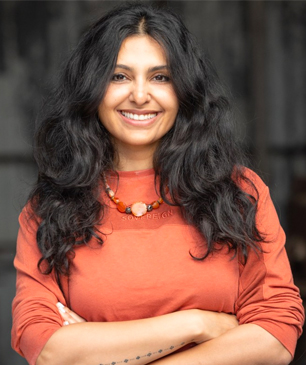
Dilafruz Khonikboyeva is the inaugural Executive Director of the Home Planet Fund, part of Patagonia’s philanthropic ecosystem. She is a transformational conflict expert, focused on civil war, climate and resource conflicts, and storytelling.
Live Event & Recordings
The live events will take place between 16:00-17:30 UTC on November 16 and November 30, 2023. (Find out what time this is for you.)
If you are unable to attend either of the live events, we encourage you to sign up anyway as links to the recordings and supplemental materials will be sent to anyone who registers below.
Register for the Event
Panelists, Session 1: Understanding the Polycrisis

Ayan Mahamoud is the Head of the Socioeconomic, Policy, Research and Marketing Department for the Centre for Pastoral Areas and Livestock Development at the Intergovernmental Authority on Development (IGAD) in Eastern Africa. Born in Djibouti and based in Kenya, Ayan is an expert in Regional and Transboundary Polycrisis, Climate Security and Climate Fragility and their policy dimensions for sustained coordinated action. She contributes to the IGAD Climate Security Agenda and collaborates with institutions across the IGAD Member States, Divisions, Specialised Institutions, along with the UN Office of the Special Envoy, UNDP, CGIAR, and various independent think tanks such as Adelphi and the Clingendael Institute. She also manages the USAID Programme Portfolio at IGAD and deals with issues related to resilience, climate fragility risks, climate adaptation, dryland development, cross-border health, countering violent extremism, and conflict prevention/early warning.
Thomas Homer-Dixon is the Executive Director of the Cascade Institute at Royal Roads University, the author of several award-winning books, and writes regularly for the Globe and Mail and has published in Foreign Affairs, Foreign Policy, Scientific American, the New York Times, the Washington Post, and the Financial Times. Tad’s research focuses on threats to global security in the 21st century, including economic instability, climate change, energy scarcity, ideological polarization, and mass violence. He also studies how people, organizations, and societies can better resolve their conflicts and innovate in response to complex problems. Tad’s work is highly interdisciplinary, drawing on political science, economics, environmental studies, geography, cognitive science, social psychology, and complex systems theory.


Ruth Richardson is the inaugural Executive Director of the Accelerator for Systemic Risk Assessment (ASRA). Launched in early 2023, ASRA aims to mobilize a diverse global network of risk professionals and thought-leaders, including the next generation, to advance the field of systemic risk and improve decision-making about current and future challenges. An independent, not-for-profit initiative hosted by the United Nations Foundation, ASRA is on a mission to accelerate transformative action that protects ecological systems and humanity from the threats of escalating systemic risks. Prior to ASRA, Ruth spent a decade as the Executive Director of the Global Alliance for the Future of Food. In that capacity she was appointed by United Nations Secretary-General António Guterres to the Advisory Committee for the 2021 Food Systems Summit. Ruth has also held roles in the private, public, and philanthropic sectors.
Panelists, Session 2: Responding to the Polycrisis

Dilafruz Khonikboyeva is the inaugural Executive Director of the Home Planet Fund, part of Patagonia’s philanthropic ecosystem. She is a transformational conflict expert, focused on civil war, climate and resource conflicts, and storytelling. Prior to joining the Home Planet Fund, Dilafruz was a political appointee of the US Biden-Harris Administration and spent five years with the Aga Khan Development Network. She is on the Advisory Board of her alma mater, the George Mason University’s Carter School for Peace and Conflict Resolution, and advises the Climate Change Working Group for Women of Color Advancing Peace, Security and Conflict Transformation (WCAPS). Dilafruz is originally from Khorog, Tajikistan and is Indigenous Pamiri.
Elizabeth Sawin is Founder and Director of the Multisolving Institute and an expert on solutions that address climate change while also improving health, well-being, equity, and economic vitality. She developed the idea of ‘multisolving’ to help people see and create conditions for such win-win-win solutions. Beth writes and speaks about multisolving, climate change, and leadership based on systems thinking to local, national, and international audiences. Her work has been published in Non-Profit Quarterly, The Stanford Social Innovation Review, U. S. News, The Daily Climate, System Dynamics Review, and more. Her work has been covered in Time, Forbes, The Washington Post as well. In 2010, Beth Co-Founded Climate Interactive, which she co-directed until 2021.


Shrishtee Bajpai is an activist-researcher from India, working with the environment action group Kalpavriksh. Her work focuses on documenting, researching, and networking on radical alternatives to dominant systems with specific focus on exploring indigenous, traditional, and customary ways of living, decision-making and their underlying worldviews. She helps in coordinating the Vikalp Sangam process (Alternatives Confluence) and is a core team member of Global Tapestry of Alternatives. She serves on the executive committee of the Global Alliance for the Rights of Nature, advisor to the Inner Climate Academy, and ex-fellow at Post Growth Institute.
Sponsoring Organizations


